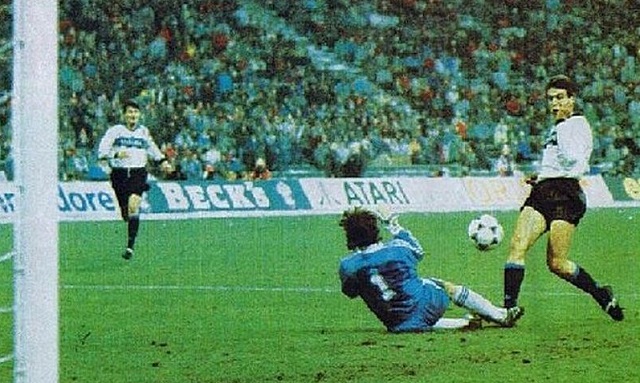Italian journalist and match analyst Michele Tossani relives a European night to remember and one of the most iconic goals of the 1980s.
It was a classic mercoledì di coppa (a midweek cup night) in a period when the European Cup, UEFA Cup Winners’ Cup and UEFA Cup fixtures were all played on the same day.
The 23rd November 1988.
Diego Maradona’s Napoli were engaged in Bordeaux to play Aimé Jacquet’s Girondins in the first leg of the third round of the UEFA Cup, a competition that Napoli would go on to win.
On the same day, Roma were trashed 2-0 by Dynamo Dresden of East Germany, while Juventus were playing against Belgium side RFC Liège in a game that was determined by a goal courtesy of Alessandro “Spillo” Altobelli. One of the former Inter player’s outstanding contributions in his only season to play in the black and white stripes of the Old Lady.
An instant Inter legend

In the meantime, Spillo’s former club, Internazionale, were set to face the German giants Bayern Munich in the old Olympiastadion. A freezing cold night in Munich in the late 1980s, the Inter squad boasted no less than three teutonic legends (Andreas Brehme, Lothar Matthäus and Jürgen Klinsmann). The stage was set for an evening of high drama.
That week, Duran Duran’s I don’t want your love and Jovanotti’s È qui la festa were competing at the top of the Italian charts. Lorenzo Cherubini (aka Jovanotti) is one of Italy’s best-known singers, a kind of music guru, well known for his philosophical approach and for the controversies surrounding his Jova Beach Parties, a popular summer music festival that attracted large hedonistic crowds.
Back then Jovanotti was still a young rapper (born in 1966), at a time when most Italians had no idea what rap music was. At number five in the charts, after Duran Duran, Jovanotti, Phil Collins (A groovy kind of love) and U2 (Desire), was Carlo Marchino (aka Charlie) with a nonsense song entitled Faccia da pirla, a Milanese slur that José Mourinho would subsequently employ at the start of his Inter career (Io non sono un pirla – “I’m not a jerk”).
Trap’s masterplan in Munich
Back to the Olympiastadion that cold night in November 1988. Inter faced one of the strongest Bayern teams of the 1980s. A team coached by Jupp Heynckes and lining up with some outstanding players that included sweeper Klaus Augenthaler (known as Franz Beckenbauer’s successor), future Juventino Stefan Reuter, the rising star Olaf Thon, and strikers Roland Wohlfarth and Jürgen Wegmann.
It was no easy task for the Nerazzurri, even with a team that Giovanni Trapattoni would lead to a record-breaking points haul and Scudetto.
The game kicked-off at 8.00 pm in a frozen, snow-covered Munich. Trapattoni thought the Germans would line up with three up front, deploying former Empoli striker Johnny Ekström alongside Wohlfarth and Wegmann.
So, preparing a more defensive side, Trap planned to leave out Argentinian striker Ramón Díaz. In the end, the Italian coach would choose the following starting XI:
Zenga, Verdelli, Bergomi, Ferri, Baresi, Berti, Matthaus, Matteoli, Brehme, Bianchi, Serena.
“The greatest European goal ever”
It would be a classic difesa e contropiede [defense and counterattack] for the Nerazzurri, executed almost to perfection. In a freezing night, despite a strong start by Bayern, Inter’s counterattacking style would flourish.
Matteoli and Matthaus were the playmakers, orchestrating their team’s movements. Despite a promising start, Bayern were unable to score. At half-time it was still nil-nil. For Inter, things were going exactly according to plan.
In the second half, the Germans started strong, besieging the penalty box defended by Inter’s iconic goalkeeper, Walter Zenga. It was exactly what Trapattoni wanted.
Bayern were unbalanced and that opened the way for Inter to counterattack. After an hour, as another Bayern attack broke down, Inter’s Andreas Brehme played a delightful cross-field pass to Aldo Serena, perfectly positioned on the halfway line to avoid the Bayern offside trap.
One-on-one against Aumann, the Italian striker slid the ball over the on-coming German keeper.
The goal forced Bayern to attack even more furiously and, of course, this opened up even more space for Inter to counterattack.
In the 72nd minute, Inter doubled their lead with one of the greatest European goals ever seen.
Berti – an Inter legend is born
Bayern were on attack, chasing an equaliser, when Nicola Berti intercepted a loose ball just a few meters outside his own penalty box. With blistering speed, the Italian midfielder stormed his way through Bayern’s defensive lines, charging directly for goal.
With extraordinary pace, Berti outran four opponents in a 70 metre sprint that brought him face-to-face with Aumann, as the Bayern goalkeeper desperately charged out to close down Inter’s rampaging number 8.
Nothing to do. With a perfectly executed scavetto, Berti scores. The goal seals the game. An impressive 0-2 victory in a time when away goals counted double in the event of a tie.
That night, Nicola Berti, the man who broke the hearts of Fiorentina fans with his transfer (just a couple of years before the more infamous Roberto Baggio transfer to Juventus) from the Arno River to Inter in the summer of 1988, became an Inter cult hero.
In the return leg in Milan two weeks later, Inter would throw away their two-goal advantage, and finish the tie 3-3 on aggregate, with Bayern progressing thanks to the away goals rule.
But that’s another story.
For Nerazzurri’s fans, that cold night in November when Nicola Berti scored one of the most iconic goals of the 1980s would be remembered forever!

